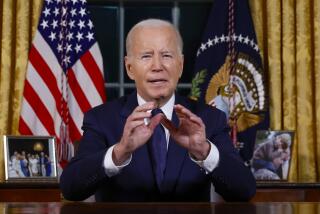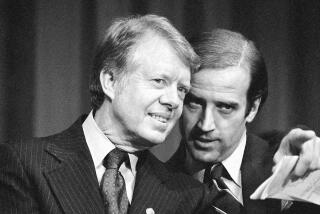NEWS ANALYSIS : Sarajevo Ultimatum Not End of Clinton’s Political Quagmire
- Share via
WASHINGTON — For President Clinton, the apparent decision by the Bosnian Serbs to accept a NATO ultimatum and remove their heavy guns from Sarajevo will not resolve a long-term political dilemma he has struggled with for more than a year.
The current hopes for relief of the besieged capital might easily be dashed by a last-minute explosion in that volatile land. But even if the Serbs fulfill their commitment, Clinton’s prominent role in forcing a reluctant Western alliance to deliver its ultimatum has raised the profile of American involvement in the intractable conflict and made backing away from future crises more difficult.
As leader of the world’s sole remaining superpower, the President still confronts the challenge of using the strife-torn Balkans as a crucible in which to fashion a post-Cold War formula for dealing with foreign crises. And he must achieve this without plunging the nation into a Vietnam-style quagmire that would wreck the activist domestic agenda he is committed to fulfilling.
Whatever happens in Sarajevo in the days just ahead, the problem of Bosnia-Herzegovina will not be over. At its best, the local truce demanded by the North Atlantic Treaty Organization would fall far short of resolving the deep-rooted conflicts that have been tearing apart the former Yugoslav federation for some two years. And the apparently unilateral decision by Moscow to send a contingent of Russian troops into the Sarajevo area only complicates the problem.
It is equally clear that as long as the threat of violence hangs over Bosnia, the demands from European allies and influential cohorts in this country for greater U.S. involvement will not cease. In fact, the United States is already at least theoretically committed to sending ground forces to the area to help maintain a U.N. peacekeeping force, although some analysts say the conditions for U.S. participation are so stringent that this may never come to pass.
“That would be a huge mistake,” Larry DiRita, a Heritage Foundation specialist on defense and foreign policy, said of the plan to dispatch about a division of U.S. forces to help patrol a partitioned Bosnia. “He (Clinton) sets himself up for the Republicans to say in 1996, ‘Look, he’s got a division bogged down in the Balkans.’ ”
In trying to play a constructive part in the Bosnian crisis, Clinton must contend not only with the murderous religious and ethnic rivalries of the Balkans but with the relative indifference of most Americans to the violent upheaval abroad.
“In foreign affairs, only two kinds of things matter to most Americans enough to be politically significant--a great success or a great defeat,” American University presidential scholar Alan J. Lichtman said. As Lichtman sees it, the chances of Clinton achieving a great success in Bosnia are slim, “so the best he can hope for is to avoid a major defeat.”
How did Clinton get himself into such a pickle? Part of the answer is the new complications in international relations--the penalty the United States and the West are paying for prevailing over communism.
“We no longer have a clear Cold War framework to guide people’s thinking,” says Stanley Greenberg, Clinton’s campaign pollster who continues to advise the White House on political strategy.
Clinton’s predecessor, George Bush, also had to cope with this lack of public focus in dealing with the first post-Cold War international crisis, in the Persian Gulf. But Bush’s task was easier because Iraq had committed a clear act of aggression by seizing Kuwait and because the Middle East with its oil supplies has long been considered vital to U.S. security.
By contrast, Clinton faces the challenge of finding a convincing justification for American involvement in a civil war being waged in a corner of the world best known to Americans only as the powder keg that set off World War I.
“When you could make the case there was a global Communist threat, you could justify sending 500,000 men to Vietnam,” public-opinion analyst Ben Wattenberg said. “But you can’t justify sending 500,000 men to Bosnia and take 200 casualties a week.”
Clinton also has himself to blame for his present conundrum, most analysts feel, because of his 1992 campaign criticism of Bush for not taking harsher measures against the Serbs. Clinton’s comments built up expectations for his own performance.
“He was obsessed by the fact that he was not in service during Vietnam and he wanted to look tough,” says Ted Van Dyk, a longtime policy adviser to Democratic presidential candidates who remembers hiring a young Bill Clinton to work as an organizer for George McGovern’s 1972 Democratic presidential campaign.
Relatively small but highly influential groups that support an activist U.S. role in the world in general and Bosnia in particular have not let the President forget his tough rhetoric. Their voices are raised in both parties and across the philosophical spectrum.
“I believe that we have both profound humanitarian and strategic concerns in Bosnia,” Jeane J. Kirkpatrick, who was President Ronald Reagan’s ambassador to the United Nations, said in a telephone interview.
“It is a function of presidential leadership to do what needs to be done and explain that to the people, and people will respond positively.”
From another corner of the ideological street, Andrew Sullivan, editor of the relatively liberal and normally Democratic magazine New Republic, denounced Clinton’s “dilatory, casuistic response to the Great Crime in the Balkans.” Sullivan accused Clinton of “transforming the only superpower in the world into the only abdicating superpower in the world.”
Whatever the merits of their cause, many of those who seek to stir outrage over the bloodshed in Bosnia make a strong appeal to the emotions.
Benetton, the Italian clothing company known for its promotion of social activism, ran a double-page ad in the Washington Post this week as part of a worldwide campaign; it depicted the blood-soaked clothes of a Bosnian soldier killed in battle along with a message from the soldier’s father urging that his son’s death be used “in the name of peace and against war.”
Clinton is finding it hard to hold his own against such arguments, despite the “bully pulpit” of his office.
“Clinton has tried every which way to avoid risks in foreign policy,” says Bert Rockman, a University of Pittsburgh presidential scholar. “But he is discovering that in situations where the highly attentive opinion makers find inaction intolerable, he can’t afford not to do anything.”
Even Clinton supporters say that to have more impact on the public debate, the President needs to do a better job of articulating the U.S. position on Bosnia. “By going to the American people and stating what the mission here (in Bosnia) is,” Clinton “would put Americans at ease . . . make himself less a target of Republicans . . . (and) send a message to the Serbs and to the world,” Delaware Sen. Joseph R. Biden Jr., ranking Democrat on the Senate Foreign Relations Committee, told reporters this week.
And some advocates of an active U.S. role in Bosnia contend that the cautious approach favored by Clinton might be the most dangerous in the long run.
“A president’s first responsibility is to keep the country safe and secure,” said American Enterprise Institute resident scholar Joshua Muravchik, foreign policy adviser to Clinton’s campaign. “If people get the feeling that this President is not competent at this No. 1 task, and other problems come up, such as the rise of a new dictatorship in Russia, then his inaction in Bosnia becomes not just a negative but a fatal weakness.”
More to Read
Get the L.A. Times Politics newsletter
Deeply reported insights into legislation, politics and policy from Sacramento, Washington and beyond. In your inbox twice per week.
You may occasionally receive promotional content from the Los Angeles Times.










